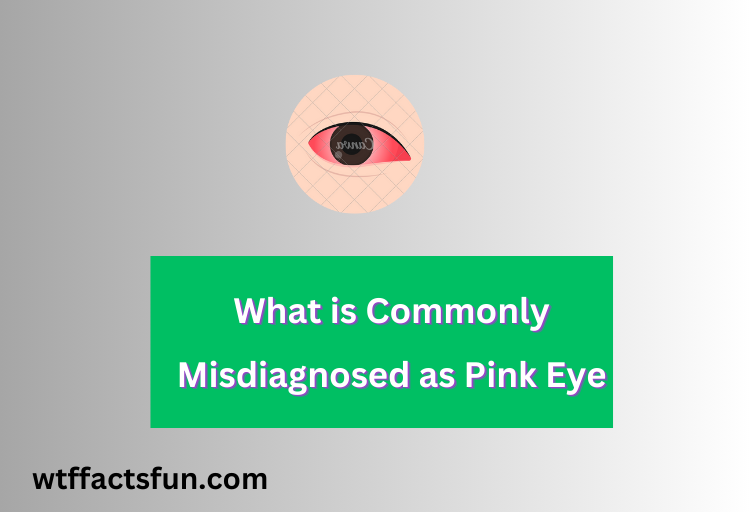
Table of Contents
What is Commonly Misdiagnosed as Pink Eye
What is Commonly Misdiagnosed as Pink Eye: Pink eye, or conjunctivitis, is a common eye condition characterized by redness, itchiness, and discharge from the eye. While pink eye is a prevalent eye ailment, there are several other eye conditions that can mimic its symptoms and are often misdiagnosed as conjunctivitis. In this article, we will delve into some of these conditions to help you better understand the differences and similarities, along with a FAQ section to address common queries.
Common Conditions Misdiagnosed as Pink Eye:
- Allergic Conjunctivitis:
- Allergic conjunctivitis shares several symptoms with pink eye, such as redness and itching. However, it is caused by allergens like pollen, pet dander, or dust mites, rather than bacteria or viruses. Antihistamines and avoiding allergens are common treatments for allergic conjunctivitis.
- Dry Eye Syndrome:
- Dry eye syndrome can cause redness and irritation in the eyes, similar to pink eye. This condition occurs when the eyes do not produce enough tears or the tears evaporate too quickly. Artificial tears and lifestyle changes are often used to manage dry eye syndrome.
- Bacterial and Viral Conjunctivitis:
- While pink eye is commonly caused by bacterial or viral infections, it can sometimes be misdiagnosed as one when it is actually the other. Bacterial conjunctivitis typically requires antibiotic eye drops, while viral conjunctivitis often resolves on its own.
- Contact Dermatitis:
- Exposure to irritants or allergens in cosmetics, eye drops, or contact lens solutions can lead to contact dermatitis around the eyes. This can result in redness, swelling, and itching, which might be mistaken for pink eye. Identifying and avoiding the irritant is key to treating contact dermatitis.
- Subconjunctival Hemorrhage:
- A subconjunctival hemorrhage occurs when a blood vessel in the eye’s white area (sclera) breaks, causing a bright red patch in the eye. Although it can look alarming, it is typically painless and resolves on its own within a few weeks. It is not contagious, like pink eye.
Conclusion:
In conclusion, while pink eye, or conjunctivitis, is a prevalent and easily recognizable eye condition, it is not the sole culprit behind redness, itching, and discomfort in the eyes. Various other eye conditions, such as allergic conjunctivitis, dry eye syndrome, contact dermatitis, and subconjunctival hemorrhage, can closely mimic the symptoms of pink eye and are often misdiagnosed.
The key takeaway is that proper diagnosis by a healthcare professional is essential to distinguish between these conditions accurately. Rushing to conclusions or self-diagnosis can lead to ineffective treatments and unnecessary worry. If you or someone you know experiences persistent eye symptoms, it is advisable to seek medical advice promptly. By doing so, you can ensure the appropriate treatment and care necessary to maintain optimal eye health and comfort.
FAQs
What are the common symptoms of pink eye?
Common symptoms of pink eye include redness, itching or burning sensation, excessive tearing, discharge (clear or pus-like), and light sensitivity.
Can pink eye be caused by allergies?
Yes, allergic conjunctivitis can mimic the symptoms of pink eye. It is caused by allergens like pollen, dust, or pet dander.
Is pink eye always contagious?
No, the contagiousness of pink eye depends on its cause. Bacterial and viral conjunctivitis are contagious, while allergic conjunctivitis is not.
How is pink eye diagnosed accurately?
Accurate diagnosis of pink eye typically involves an eye examination by a healthcare professional. In some cases, they may take a swab of the eye discharge for lab testing to determine the cause.
What is the treatment for pink eye?
Treatment for pink eye varies depending on the cause. Bacterial conjunctivitis is treated with antibiotic eye drops, while viral conjunctivitis usually resolves on its own. Allergic conjunctivitis can be managed with antihistamines and avoiding allergens.
Read also:
8 Character Password Examples: Strengthening Your Online Security
20 Best Killer Whale Facts for Kids (Orca)
What is the Ugliest Zodiac Sign? Debunking Myths About Cancer